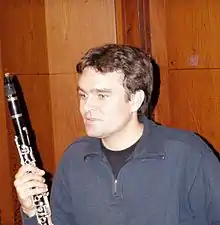| Fantasie | |
|---|---|
| by Jörg Widmann | |
 The composer in 2006 | |
| Period | Contemporary |
| Composed | 1993 |
| Published | 2005: Mainz |
| Publisher | Schott Music |
| Duration | 7:00[1] |
| Scoring | clarinet in B♭ |
| Premiere | |
| Date | 1 March 1994 |
| Location | Bayerischer Rundfunk, Munich |
| Performers | Jörg Widmann |
Fantasie for Solo Clarinet is a solo instrumental work by Jörg Widmann and was composed in 1993. It is a showpiece.[2] It offers a Romantic melodious sound with dance, klezmer and jazz music elements[1] in a "Harlequin spirit".[2]
History
The Fantasie for Solo Clarinet, composed in 1993, is one of Widmann's earliest compositions.[3] He was inspired by Igor Stravinsky's Three Pieces for Solo Clarinet (1919) and Pierre Boulez's Dialogue de l'ombre double (1985) for clarinet and tape.[4] Widmann had in mind the Harlequin figure from the Italian commedia dell'arte.[4][lower-alpha 1] The piece was premiered by the composer on 1 March 1994 at Bayerischer Rundfunk in Munich.[1]
Music
Widmann wrote the Fantasie, when he was just twenty years old. It's an expression of "youthful exuberance" with "virtuoso flourishes".[3] He combines conventional playing with extended techniques (multiphonics, flutter-tonguing, key clicks),[5] and non-pitched sounds.[3] Widmann's skills in clarinet playing helped him in composing his Fantasie.[6] The piece is full of extremes in dynamic, tempo, and character.[7] Widmann disproved with a sustained four-note chord, that the clarinet is only a one-voice instrument.[8] According to Widmann, the opening multiphonic of the Fantasie is being a parody of new music, since many new works of that time begin in a similar manner.[4] Widmann identifies harmony as the central theme of the work.[9] A typical sound are glissandos in the upper registers, in a klezmer or "exaggeratedly jazzy" style.[2] Silences are important, Widmann notates them as a breath mark, a breath mark with a fermata, and an actual rest.[2] Near the beginning the composer cites a melody from The Rite of Spring.[10]
Structure
Sections:[11]
- Free, rhapsodically
- Fast, brilliant
- Presto possible
- Tempo come prima, ma poco più mosso
Reception
The Fantasie is one of Widmann's most frequently performed works and is standard repertory of unaccompanied works for clarinet.[7] Zachary Woolfe from The New York Times wrote: "...sounding like the most beautiful circus music ever written."[10]
Recordings
- Bettina Aust and Robert Aust, Bettina Aust – Deutscher Musikwettbewerb, Laureate 2015, Clarinet, Recorded at Ehemalige Sendestelle des Deutschlandradios, 16–19 October 2015, GENUIN classics, GEN 16432, 2016, compact disc. OCLC 987272763
- Eduard Brunner, Music for Solo Clarinet, Recorded in Studio 2, Bayerischer Rundfunk, Munich, 14–15 December 2009, Naxos, 8.572470, 2011, compact disc. OCLC 1080882095
- Stefan Neubauer, Solitary Changes, Recorded between 2012 and 2013, Orlando Records, or 0006, 2013. OCLC 887469607
Notes
- ↑ Widmann was not aware of the unaccompanied clarinet work Harlekin (1975) by Karlheinz Stockhausen.[4]
References
- 1 2 3 "Fantasie". Schott Music. 3 June 2020. Retrieved 14 February 2021.
- 1 2 3 4 "Jörg Widmann's "Fantasie" with Andrew Lowy". LA Phil. Retrieved 11 December 2020.
- 1 2 3 Dierickx 2018, p. 24.
- 1 2 3 4 Dierickx 2018, p. 103.
- ↑ Schmidl, Christina (28 October 2013). "Kritik: Jörg Widmann Gesprächskonzert". Klassikinfo.de (in German). Retrieved 26 April 2021.
- ↑ Dierickx 2018, p. 76.
- 1 2 Dierickx 2018, p. 102.
- ↑ Kaiserkern, Babette (16 October 2020). "Solist, Komponist, Dirigent: Jörg Widmann ist eine Ausnahmeerscheinung der Musik". Der Tagesspiegel (in German). Retrieved 3 August 2023.
- ↑ Dierickx 2018, p. 104.
- 1 2 Woolfe, Zachary (15 April 2013). "On Clarinet, the Composer". The New York Times. New York City. Retrieved 22 August 2017. (subscription required)
- ↑ Dierickx 2018.
Sources
- Dierickx, Zachary (2018). The Clarinet Works of Jörg Widmann: A Performance Guide to Fantasie for Clarinet Solo with a Survey of Unaccompanied Clarinet Repertoire and Guide to Contemporary Techniques (DMA thesis). Ohio State University.
- Mala, Defrim (2019). The music avangard Jörg Widmann and an analyse on his main work "The Fantasie for Clarinet Solo" (Master's thesis). University of Agder. hdl:11250/2628871. Retrieved 4 June 2023.
Further reading
- Fein, Markus (2005). Im Sog der Klänge – Gespräche mit dem Komponisten Jörg Widmann (in German). Mainz: Edition Neue Zeitschrift für Musik. ISBN 978-3-7957-0535-0.